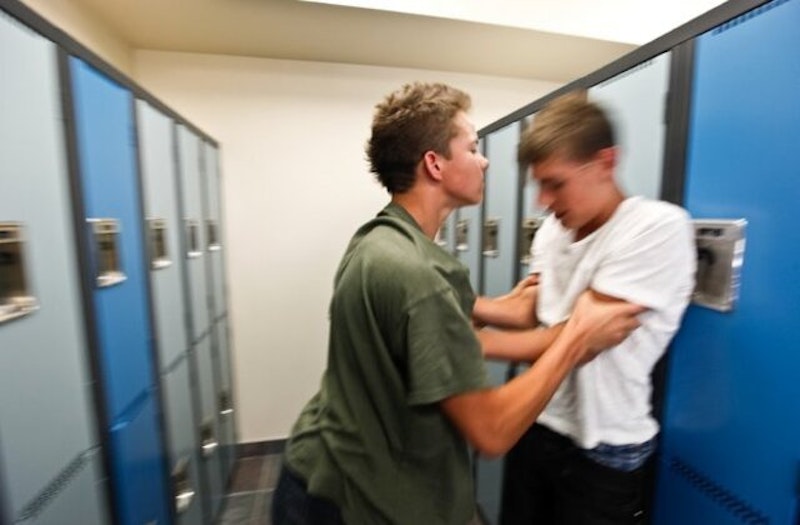Bullying is everywhere now. It hides in classrooms and chatrooms, lurking even in spaces built to make children feel “safe.” Kids who once feared the playground tyrant now face a mob armed with avatars and emojis. To most, it’s a moral emergency. To psychologists, a public health crisis. To parents, a never-ending nightmare. And yet—what if it isn’t entirely bad?
At 13, I was short, fat and slow. I was teased, shoved, mocked, and occasionally used as target practice. I got beaten up so often I began to plan for it. But humiliation, it turns out, can be a hell of a motivator. Somewhere between the wedgies and the wisecracks, something primitive stirred. I joined a boxing gym. Later, I learned to kickbox. The pudgy boy who couldn’t fight back became the young man who could.
I’m not endorsing Hallmark wisdom about pressure making diamonds. It didn’t. It made scar tissue, calluses, and a sixth sense for spotting fake smiles. But it made me strong. Pain taught me what praise never could. That life rewards the relentless more than the resigned.
Bullying, in a strange way, introduces you early to the natural order. It isn’t fair or kind, but neither is evolution. The schoolyard is the closest thing modern life has to the savannah. Some are lions. Many, like myself for a while, are injured gazelles. Before schools sterilized everything with campaigns about empathy, kids learned hierarchy the honest way: through a few well-placed punches and the sting of a swollen lip. You found your place, you fought for it. And, if you were clever, you learned how not to end up in the school skip next time.
Adversity does what comfort never will. Modern childhood is bubble-wrapped in emotional cotton wool. Every setback is treated like trauma. But the mind needs Sisyphus-like challenges. When you’re roasted and ridiculed, you adapt. You develop the smarts to survive.
The problem today isn’t too much bullying; it’s too little backbone. We’ve pathologized toughness and glorified fragility. Schools treat playground scuffles like war crimes. Everyone’s a victim. Everyone needs a “safe space.” However, by protecting children from every sting, we rob them of the very friction that forms strength. A world without bullies sounds great until you realize it produces citizens who need therapy after a group chat disagreement.
Also, the definition of bullying has ballooned beyond recognition. It used to mean being thumped, tripped, or humiliated in front of a crowd. Now it means disagreeing with someone on X. A sarcastic comment is “verbal abuse.” Forgetting to like a friend’s post is “social exclusion.” We’ve gone from black eyes to blocked accounts. Classrooms have “no-meanness policies” so sweeping they make Orwell look like an optimist. A teacher telling a student to toughen up can now be accused of psychological harm. Somewhere, someone is probably writing a dissertation on the oppressive power dynamics of dodgeball.
If everyone’s a victim, there are no victors. Just a nation of walking trigger warnings and professional complainers.
Bullies aren’t noble or unsung heroes. Some are simply sadists in training. But the experience of being bullied—the confrontation with fear and humiliation—can be transformative if met with the right response. The real question isn’t how to prevent every blow. It’s how to help someone stand up after taking one.
Looking back, I can almost thank the kids who haunted me in the mornings, afternoons and just before boarding the bus home. They made me sharper, leaner, meaner—and paradoxically, more humane. Once you’ve been demeaned enough, you either learn compassion or you learn vengeance. I leaned toward the former but kept a trace of the latter for emergencies.
Now, when adults insist that “violence is never the answer,” I laugh. Violence is often the question. And sometimes, unfortunately, the solution. Life doesn’t hand out participation trophies. It throws jabs. Bullying is ugly. It can destroy. But it can also awaken something raw and real, a recognition that life is, at its core, a contest of endurance. You don’t build character by being coddled.
Would I wish my 13-year-old torment on anyone? Not quite. But would I trade what it taught me for a childhood of comfort and coddling? Not in a million punches. Better to be the boy who was bullied and learned to fight than the boy who was sheltered and stayed small.

